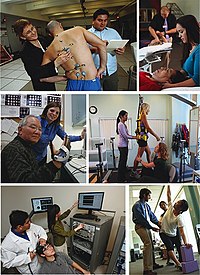
Photo from wikipedia
Background Robot-assisted therapy (RAT) and virtual reality (VR)-based neuromotor rehabilitation have shown promising evidence in terms of patient’s neuromotor recovery, so far. However, still little is known on the perceived… Click to show full abstract
Background Robot-assisted therapy (RAT) and virtual reality (VR)-based neuromotor rehabilitation have shown promising evidence in terms of patient’s neuromotor recovery, so far. However, still little is known on the perceived experience of use of robotic and VR devices and the related psychosocial impact. The present study outlines a study protocol aiming to investigate the biopsychosocial effects and the experience of use of robotic and non-immersive VR devices in patients undergoing neuromotor rehabilitation. Methods Adopting a prospective, two-arm, non-randomized study design, patients with different neuromotor diseases (i.e., acquired brain injury, Parkinson’s Disease, and total knee/hip arthroplasty) undergoing rehabilitation will be included. In a real-world clinical setting, short- (4 weeks) and long-term (6 months) changes in multiple patient’s health domains will be investigated, including the functional status (i.e., motor functioning, ADLs, risk of falls), cognitive functioning (i.e., attention and executive functions), physical and mental health-related quality of life (HRQoL), and the psychological status (i.e., anxiety and depression, quality of life satisfaction). At post-intervention, the overall rehabilitation experience, the psychosocial impact of the robotic and VR devices will be assessed, and technology perceived usability and experience of use will be evaluated through a mixed-methods approach, including both patients’ and physiotherapists’ perspectives. Repeated measures within-between interaction effects will be estimated, and association analyses will be performed to explore the inter-relationships among the variables investigated. Data collection is currently ongoing. Implications The biopsychosocial framework adopted will contribute to expanding the perspective on patient’s recovery within the technology-based rehabilitation field beyond motor improvement. Moreover, the investigation of devices experience of use and usability will provide further insight into technology deployment in neuromotor rehabilitation programs, thereby maximising therapy engagement and effectiveness. Trial registration ClinicalTrials.gov ID: NCT05399043.
Journal Title: PLOS ONE
Year Published: 2023
Link to full text (if available)
Share on Social Media: Sign Up to like & get
recommendations!